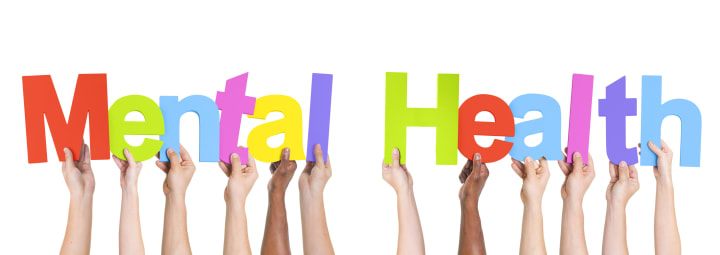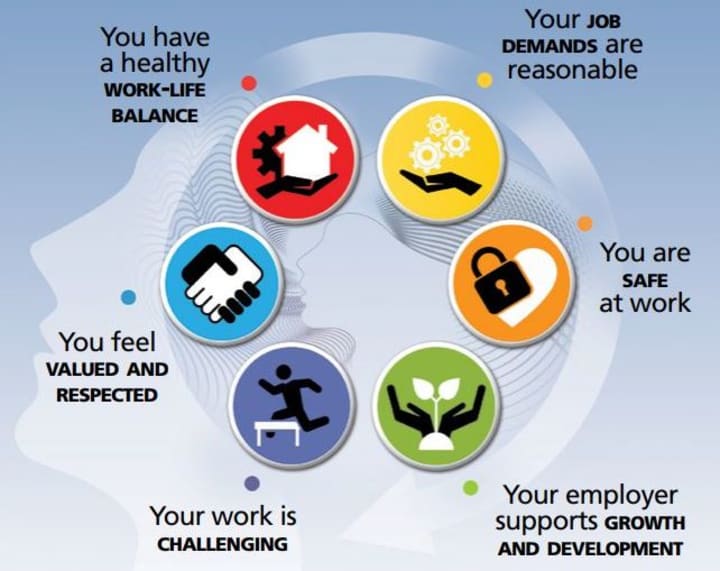Creating A Healthy Mental Diet
Mindfulness for beginners to create a healthy mental diet.

Do you experience mind fog or too many roaming thoughts on a daily or weekly basis? Have you ever wanted to figure out how to tame the overactive mind chatter in your brain?
What is good mental health?
Good mental health is characterized by a person's ability to fulfil a number of key functions and activities, including: the ability to learn. the ability to feel, express and manage a range of positive and negative emotions. the ability to form and maintain good relationships with others.
Why is it important to take care of your mental health?
Mental health includes our emotional, psychological, and social well-being. It affects how we think, feel, and act. Your mental health, good or bad influences our lives and the choices we make.
It also determines how we handle our everyday stressors. As well as how we relate to others. Mental health is extremely important at every stage of life, from childhood and adolescence through adulthood.

Steps to have a healthy mental health
There are so many ways to heal yourself mentally. The most effective way to get better at noticing when you've left the present moment is to practice mindfulness in small ways as often as you can
Think about your thoughts and/or feelings as they come. As we think about our feelings it helps us stay in good mental health and deal with those moments when you feel troubled.
Focus on one thing in the moment, this equates to being mindful of the present moment. Practicing this habit daily allows you to become more focused naturally. Here's a list of a few things that help when cultivating a healthy mental state.
- Excercise
- Eat well.
- Give yourself a break
- Keep in touch with reality .
- Take care of your body:
- Meditate ( Quiet your mind )
- Surround yourself with good people:
- Give yourself a break .
- Cut out alcohol/drug consumption
- Learn how to deal with stress:
- Be mindful
- Set realistic goals:
- Get enough sleep
- Value yourself: Treat yourself with kindness and respect, and avoid self-criticism
Regular exercise can have a profoundly positive impact on depression, anxiety, ADHD, and more. It also relieves stress, improves memory, helps you sleep better, and boosts your overall mood
Mental health is much more than a diagnosis. It is literally our overall psychological well-being as well as the way we actually feel about ourselves and others including our ability to manage our feelings and deal with everyday difficulties. Taking care of our mental health simply means taking steps to choose to improve our own emotional health. Making these easy changes will definitely pay off in all aspects of your life. In doing so, it can boost your mood, build strength, resilience, and add to your overall enjoyment of life.
The best-researched method to increase feelings of gratitude is to keep a gratitude journal or write a daily gratitude list.
- Write down something you are grateful for. Gratitude is linked with improving well-being and mental health, as well as happiness.
- Generally contemplating gratitude is also effective, but you need to get regular practice to experience long-term benefit. Find something to be grateful for, let it fill your heart, and bask in that feeling.
Your body releases stress-relieving and mood-boosting endorphins before and after you work out, which is why exercise is a powerful antidote to stress, anxiety, and depression. Look for small ways to add activity to your day, like taking the stairs instead of the elevator or going on a short walk. To get the most benefit, aim for at least 30 minutes of exercise daily, and try to do it outdoors. Exposure to sunlight helps your body produce vitamin D, which increases your level of serotonin in the brain. Plus, time in nature is a proven stress reducer.

The first step is to understand what's meant by mindfulness: First and foremost it's about consciously choosing to pay attention to the present moment. Mindfulness requires noticing when our thoughts are drifting to the past or wandering ahead into the future or worrying rather than engaging with what is right in front of us. Every time we are able to step away from the roller coaster ride going on in our mind and focus on the present, we can give ourselves the best possible chance to make the best possible choice that's in our best interest.
There is absolutely no way to fail at mindfulness, which is one of its many gifts. Which means that we have another chance to step back into the present moment, but only if we notice that our mind has in fact wandered in the first place.
However, trying to be mindful for the first time in the middle of a crisis is a lot like trying to get a home run when you've never gone to a single practice. The object here is to start when it's easy. No need to make it harder for yourself!
Start when it's easy. Start with the pleasant moments, and you'll be ready to deal with life's challenges when they come your way.
The most effective way to get better at noticing when you've left the present moment is to practice mindfulness in small ways as often as you can. Here are six simple tips to get you started:
Practice being mindful is also the same as practicing being present which can be as simple as paying attention to something you do daily. Start off by choosing one or two activities you do every day like eating breakfast, driving to work, or reading a book to your children at bedtime and simply get in the habit of paying attention to what you're doing as it's happening. It's normal for your mind to wander, possibly within a few seconds, but don't sweat it. Just bring your attention back to your food or the book.
How To Start A Practice Of Mindfulness
Approach situations with curiosity. If you're not sure how to respond to a situation, or if you're feeling frustrated in ways that aren't helpful, try getting curious about what is happening instead. You can't be angry and interested at the same time. It just doesn't work that way. Not only will your curiosity help you get out of a difficult headspace, but it will likely help you gain a little more clarity so you can make the most informed choice about how to move forward.
Don't get me wrong – you'll still forget to be mindful more often than you'd like, and you'll still have moments that you wish you had handled differently. But you'll also be able to get back on track more quickly and let go more easily than before.
As you practice moments of mindfulness on a regular basis, you will notice that they come more naturally and easily to you. You'll be more likely to slow down at critical moments in the day, and you'll find it much easier to take a few deep breaths so you can respond thoughtfully rather than react hastily to a fussy child or difficult colleague.

About the Creator
Silena Le Beau
She expresses her gift of writing through each piece. She studied writing in college and has been inspiring people for 20 years. She gives back to the community & enriches them with enlightenment. Philanthropist, Empath and Nature lover.






Comments
There are no comments for this story
Be the first to respond and start the conversation.